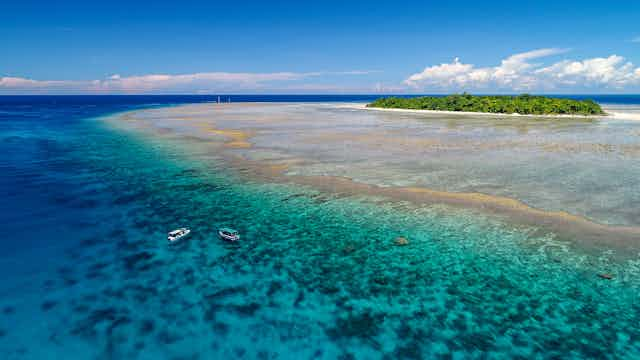The world’s tropical oceans are suffering turbulent times. Dire predictions of yet more disastrous coral bleaching episodes have been released, placing the very future of wonders like the Great Barrier Reef in danger. Without global action to prevent runaway climate change, we as individuals are largely powerless to stop such loss.
With a heavy heart we are now at a marine conservation crossroads. All paths look precarious at best. Do we continue to chase the possibility of developing a means to save and restore our coral reefs as the global climate becomes more and more inhospitable? Or do we follow a new path? One that takes stock of what can be saved, and develops viable solutions that maximise the potential of the oceans.

In Australia, the government has granted AUS$444m to the Great Barrier Reef foundation to find an innovative solution to the problems faced by its namesake coral reef. Proposals for reef shading, spreading of lime (to reduce seawater acidity), and “coral IVF” are all being investigated. In addition, major donor funding totalling US$86m has been given to the 50 Reefs programme aimed at saving some of the world’s most resilient coral reefs from climate decimation. But these aren’t solutions to the problem, they are merely sticking plasters. Despite lots of diverse work being carried out to save them it’s looking increasingly likely that many coral reefs are going to be lost and we need to start addressing the problems that this will cause.
The loss of the world’s coral reefs will result in hundreds of millions of people needing alternative supplies of food as these fisheries habitats rapidly decline in productivity. We are already seeing movement away from coral reef fisheries. In eastern Indonesia, research has found fishers are increasingly dependent on alternative habitats such as seagrass meadows and mangrove forests, instead of degraded and damaged coral reef habitats. By moving away from coral reefs, this highly intense fishing is being focused onto smaller areas. This decimates fish stocks even further, destroying the ecological balance of the tropical seascape.
Much commendable conservation and research work is being done to make coral reefs more resilient to climate change. But their global functioning in support of fisheries is collapsing now, and we need current, real world solutions to this as well as blue sky innovation.
Conservation priorities
In our newly published article we argue that there is an urgent need to take heed of the warnings of a future widespread decline in the productivity of coral reef fisheries, and broaden the focus of tropical marine conservation.
Burying our heads in the sand as fisheries move and their negative impact is concentrated elsewhere can no longer be an option for marine conservation. The world needs to look at how conservation efforts can maximise fisheries resources and sustainability throughout the tropical marine seascape. This is not about moving away from coral reef conservation, it’s about taking a much more holistic view of tropical marine conservation. We need to now think about how we can ensure people can continue to sustain themselves into the future. All too often tropical conservation ignores anything that isn’t coral. A rapidly changing climate means that such tunnel vision conservation is no longer viable.
Looking to other components of this seascape, practicable conservation opportunities do exist to develop sustainable ways to respond to increased resource use, such as fishing gear management. The problems faced by seagrasses, for example, are immediately related to catchment management and coastal development rather than global climate change. These and other drivers are largely manageable, and threats can be reduced. Yet they are largely off the marine conservation radar.
Although habitats like seagrass meadows are sensitive to a changing climate too, predicted scenarios suggest a much brighter future for them than for coral reef systems. We have global evidence of the value of seagrass ecosystems in supporting fisheries production and helping to sequester carbon dioxide from our atmosphere. Targeted action now could restore and protect them in to the future.
Coral reefs rightly have had a lot of attention but we believe that now is the time for global conservation efforts to look beyond the reefs and focus on other vital areas of ocean conservation too.

